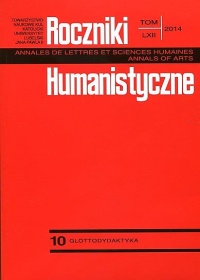Discursive Transgressions: Construing the Identity and Social Skills in the Foreign Language Classroom
Abstract
Communication under formal conditions is a type of a peculiar institutional discourse; one of its most important features is an asymmetric division of roles and interactive places. However, observations of communication micro-sequences in a foreign language group show that interlocutors having a hierarchically lower position (learners) make attempts to question the order by going out of the IRE structure (initiation – reaction – evaluation). On examples selected from a corpus of foreign language classes collected in several Polish schools (French as a foreign language) communication behaviors are shown that are defined here as discursive transgressions, and we analyze them with respect to their possible effect on the process of a foreign language acquisition.
References
Allwright, D. 1984. The importance of interaction in classroom language learning. Applied Linguistics 5. 156-171.
Allwright, D. 1983. Classroom-centered research on language teaching and learning: A brief historical overview. TESOL Quarterly 17. 191-204.
Berthoud, A.-C. & B. Py. 1993. Des linguistes et des enseignants. Maîtrise et acquisition des langues secondes. Berne: Peter Lang.
Dabène, L. 1984. Pour une taxinomie des opérations métacommunicatives en classe de langue étrangère. Études de Linguistique Appliquée 55. 39-46.
de Pietro, J.-F., M. Matthey & B. Py. 2004. Acquisition et contrat didactique: les séquences potentiellement acquisitionnelles dans la conversation exolingue. In Gajo, L. et al. (éds). Un parcours au contact des langues. Textes de Bernard Py commentés. Paris: Didier. 79-93.
Frauenfelder, U. & R. Porquier. 1979. Les voies d’apprentissage en langue étrangère. Travaux de Recherche sur le Bilinguisme 17. 37-64.
Gajo, L. & L. Mondada. 2000. Interactions et acquisitions en contexte. Modes d’appropriation de compétences discursives plurilingues par de jeunes immigrés. Fribourg: Editions Universitaires Fribourg.
Janicka, M. 2013. Preferencje dotyczące technik korekty błędów językowych w wypowiedziach ustnych na tle dyskursu pedagogicznego w klasie językowej. In Pawlak, M. (red.). Rola dyskursu edukacyjnego w uczeniu się i nauczaniu języka obcego. Poznań-Kalisz: Wydawnictwo UAM. 261-281.
Kemps, N. et al. 2009. La communication en classe de langue. Différences de contextes d’enseignement entre le FLE et l’ALE. In Galatanu, O. et al. (éds). Construction du sens et acquisition de la signification linguistique dans l’interaction. Bruxelles: Peter Lang. 105-121.
Klein, W. 1986. Second Language Acquisition. Cambridge: Cambridge University Press.
Kouhan, B. 2012. Dyskurs edukacyjny na lekcji języka obcego w polskim liceum a brytyjskim The Sixth Form College – wyniki badań porównawczych. Neofilolog 38/2. 201-222.
Long, M. 1991. Focus on form: A design feature in language teaching methodology. In de Bot, K. et al. (éds). Foreign Language Research in Cross-Cultural Perspective. Amsterdam: John Benjamins. 39-52.
Matthey, M. 2010. Interaction: lieu, moyen ou objet d’acquisition? In Vargas, C. et al. (éds). Langues et sociétés. Approches sociolinguistiques et didactiques. Paris: L’Harmattan. 31-42.
Pekarek Doehler, S. 2002. Formes d’interaction et complexité des tâches discursives: les activités conversationnelles en classe de L2. In Cicurel, F. & D. Véronique (éds). Discours, action et appropriation des langues. Paris: Presses Sorbonne Nouvelle. 117-130.
Pekarek Doehler, S. 2000. Approches interactionnistes de l’acquisition des langues étrangères: concepts, recherches, perspectives. Acquisition et Interaction en Langue Etrangère 12. 3-26.
Piotrowski, S. 2011a. Apprentissage d’une langue et communication. Négociations et stratégies en classe de langue étrangère. Lublin: Towarzystwo Naukowe KUL.
Piotrowski, S. 2011b. On the authenticity of communication in the foreign language classroom. In Pawlak, M., E. Waniek-Klimczak & J. Majer (eds.). Speaking and Instructed Foreign Language Acquisition. Bristol: Multilingual Matters. 215-229.
Piotrowski, S. 2006. Uniformizacja zadań w klasie języka drugiego. In Krieger-Knieja, J. & U. Paprocka-Piotrowska (red.). Komunikacja językowa w społeczeństwie komunikacyjnym. Lublin: Towarzystwo Naukowe KUL. 194-201.
piotrowski, s. 2005. Kompetencja egzolingwalna w klasie języka drugiego. In Karpińska-Szaj, K. (red.). Nauka języków obcych w dobie integracji europejskiej. Łask: Leksem. 241-248.
Pochon-Berger, É. & Pekarek Doehler, S. 2011. Le développement de la compétence d’interaction en langue seconde: une comparaison entre deux groupes d’apprenants du français. In Trévisiol-Okamura, P. & G. Komur-Thilloy (éds). Discours, acquisition et didactique des langues. Les termes d’un dialogue. Paris: Orizons. 243-260.
Porquier, R. & B. Py. 2004. Apprentissage d’une langue étrangère: contextes et discours. Paris: Didier.
Richards, K. 2006. ‘Being the Teacher’: Identity and Classroom Conversation. Applied Linguistics 27. 51-77.
van Dijk, T.A. 1979. Les textes de l’enfermement. Vers une sociologie critique du texte. In L’enfermement. Travaux et mémoires de la Maison Descartes d’Amsterdam 3. Lille: Presses Universitaires de Lille. 25-42.
Wilczyńska, W. 2012. Czy pojęcie dyskursu jest przydatne w glottodydaktyce? Neofilolog 38/1. 7-25.
Copyright (c) 2014 Roczniki Humanistyczne

This work is licensed under a Creative Commons Attribution-NonCommercial-NoDerivatives 4.0 International License.





